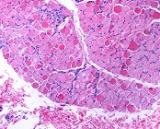Perinatal Substance Use Disorder: Focus on Postpartum Period

Identification and early intervention for pregnant and postpartum women with substance-use disorders (SUD) are critical for optimizing maternal and neonatal health and wellbeing. The risk factors, common barriers to treatment, evidence-based practices around screening and interventions, and the framework for collaborative strategies to support pregnant and postpartum women with SUD will be discussed.
Category
- Behavioral health
Format
- Webcasts
Credits
- 1.00 ACPE - Pharmacists
- 1.00 ACPE - Pharmacy Technicians
- 1.00 AMA - Physicians
- 1.00 ANCC - Nurses
- 1.00 APA - Psychologists
- 1.00 Attendance - General Attendance
- 1.00 ASWB - Social Workers
Perinatal Behavioral Health With a Focus on Substance Use Disorder

Identification and early intervention for pregnant and postpartum women with substance-use disorders (SUD) are critical for optimizing maternal and neonatal health and wellbeing. The risk factors, common barriers to treatment, evidence-based practices around screening and interventions, and the framework for collaborative strategies to support pregnant and postpartum women with SUD will be discussed.
Category
- Behavioral health
Format
- Webcasts
Credits
- 1.00 ACPE - Pharmacists
- 1.00 ACPE - Pharmacy Technicians
- 1.00 AMA - Physicians
- 1.00 ANCC - Nurses
- 1.00 APA - Psychologists
- 1.00 Attendance - General Attendance
- 1.00 PRC-CPD - Philippine Professional Nursing
- 1.00 ASWB - Social Workers
Providing Quality Care for Adults With Intellectual and Developmental Disabilities

This activity will provide learners with an overview of clinical considerations in adults with IDD and improve communication skills and practices that can better guide treatment choices to address the specific needs of these individuals. Learners will take a closer look at existing bias, stigma and discrimination toward these individuals and learn strategies to address these issues in practice. Lastly, the value of improved interprofessional team collaboration between health care professionals (HCPs), caregivers and direct support professionals will be discussed.
Category
- Intellectual and developmental disabilities
Format
- Webcasts
Credits
- 2.00 ACPE - Pharmacists
- 2.00 ACPE - Pharmacy Technicians
- 2.00 AMA - Physicians
- 2.00 ANCC - Nurses
- 2.00 APA - Psychologists
- 2.00 Attendance - General Attendance
- 2.00 CCMC - General - Case Managers
- 2.00 CDR - Dietitians
- 2.00 COPE - Optometrists
- 2.00 ASWB - Social Workers
Beyond the Video Visit: A Complete Guide to Digital Health Modalities

This activity will explore a variety of digital health modalities and help learners understand the broad landscape of digital medicine and beyond. It will discuss the potential for these modalities to enhance health care delivery, offer increased access to health care and ultimately improve patient outcomes.
Category
- Digital health
Format
- Webcasts
Credits
- 1.00 ACPE - Pharmacists
- 1.00 ACPE - Pharmacy Technicians
- 1.00 AMA - Physicians
- 1.00 ANCC - Nurses
- 1.00 APA - Psychologists
- 1.00 Attendance - General Attendance
- 1.00 CCMC - General - Case Managers
- 1.00 ASWB - Social Workers
Duchenne Muscular Dystrophy: Utilizing Personalized Treatments and Addressing Health

This activity will discuss emerging therapies for DMD and the importance of incorporating a personalized interprofessional care plan, along with the role of health disparities and how these impacts access to care and outcomes for these individuals.
Category
- Disease management
- Health equity
- Rare diseases
Format
- Webcasts
Credits
- 1.00 ACPE - Pharmacists
- 1.00 ACPE - Pharmacy Technicians
- 1.00 AMA - Physicians
- 1.00 ANCC - Nurses
- 1.00 APA - Psychologists
- 1.00 Attendance - General Attendance
- 1.00 CCMC - General - Case Managers
- 1.00 ASWB - Social Workers
Impact of Climate Change on Behavioral Health

This activity will examine the mental health effects of climate change and climate-related events on individuals and provide an overview of the populations more vulnerable to these impacts, including people with mental health issues, chronic health conditions, and those of poorer social determinants of health (SDOH), which include lower socioeconomic status, decreased access to quality health care, poorer environmental conditions, and heightened levels of experienced discrimination and bias. The negative impact of climate change on health disparities and community wellbeing will also be examined. A discussion of strategies that can mitigate the negative mental health effects of climate change, support individual resilience, improve the relationships between patients and their health care professionals, and promote positive outcomes will be discussed.
Category
- Behavioral health
Format
- Webcasts
Credits
- 1.00 AMA - Physicians
- 1.00 ANCC - Nurses
- 1.00 APA - Psychologists
- 1.00 Attendance - General Attendance
- 1.00 ASWB - Social Workers
Supporting Resiliency in Older Adults: A Focus on Life’s Purpose

This activity will provide an overview of the role of resilience and PIL, examine characteristics associated with resilience and PIL and describe intervention strategies to promote resilience and successful aging in older adults.
Category
- Behavioral health
- Health equity
- Older adults
Format
- Webcasts
Credits
- 1.00 ACPE - Pharmacists
- 1.00 ACPE - Pharmacy Technicians
- 1.00 AMA - Physicians
- 1.00 ANCC - Nurses
- 1.00 APA - Psychologists
- 1.00 Attendance - General Attendance
- 1.00 CCMC - General - Case Managers
- 1.00 ASWB - Social Workers
Preventing Falls in Older Adults: Risk Factors and Interventions

This activity will discuss The Strategies to Reduce Injuries and Develop Confidence in Elders (STRIDE) trial, which aims to evaluate the effectiveness of evidence-based strategies to reduce serious fall-related injuries,. In addition, faculty will identify risk factors that contribute to falls in the older adult as well as for individuals in SNFs, and provide interventions to reduce the risk of falls. The importance of a multidisciplinary approach in fall management will also be explored.
Category
- Disease management
Format
- Webcasts
Credits
- 1.00 ACPE - Pharmacists
- 1.00 ACPE - Pharmacy Technicians
- 1.00 AMA - Physicians
- 1.00 ANCC - Nurses
- 1.00 APA - Psychologists
- 1.00 Attendance - General Attendance
- 1.00 ASWB - Social Workers
The Pandemic-Related Transformation of Behavioral Health Care Delivery: 2022 and Beyond

In this activity, participants will explore the pandemic’s impacts on individuals’ mental health, including the increasing risks for, and prevalence of, stress, anxiety and post-traumatic stress disorder, especially for special populations such as front-line personnel (i.e., health care professionals (HCPs), teachers and funeral directors), children and the millennial and geriatric populations. In addition, participants will review the multifaceted effects of the pandemic on the behavioral health care delivery system, specifically regarding access to care, delivery of services and digital health utilization. The implications for current and future utilization of delivery modalities, such as telehealth, behavioral health coaching and other mental health care management strategies will be discussed, taking into consideration the behavioral health care concerns that have emerged during this transitional time in response to the transforming health care landscape and the population’s evolving mental health care needs.
Category
- Behavioral health
Format
- Webcasts
Credits
- 1.00 ACPE - Pharmacists
- 1.00 ACPE - Pharmacy Technicians
- 1.00 AMA - Physicians
- 1.00 ANCC - Nurses
- 1.00 APA - Psychologists
- 1.00 Attendance - General Attendance
- 1.00 ASWB - Social Workers
Complex Medical Conditions in Children: Utilizing Personalized Treatments and Addressing Health Disparities

This activity will focus on the connection between SDoH and how they may impact access to care, treatment and health outcomes for children with rare and CMC. Learners will be provided with strategies and resources that can address these negative effects. The importance of access to personalized care that they require to live their healthiest lives will be addressed.
Category
- Disease management
- Health equity
Format
- Webcasts
Credits
- 1.00 ACPE - Pharmacists
- 1.00 ACPE - Pharmacy Technicians
- 1.00 AMA - Physicians
- 1.00 ANCC - Nurses
- 1.00 APA - Psychologists
- 1.00 Attendance - General Attendance
- 1.00 CCMC - General - Case Managers
- 1.00 ASWB - Social Workers

 Facebook
Facebook Twitter
Twitter LinkedIn
LinkedIn Forward
Forward